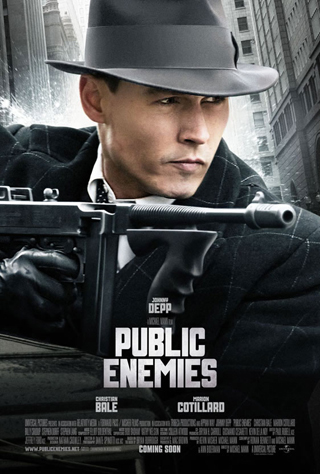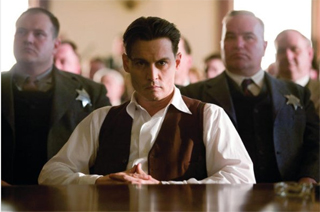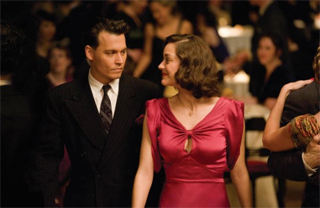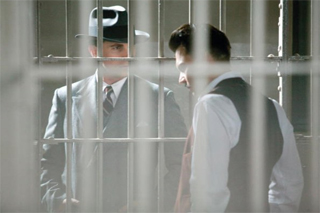|
Public
Enemies
Even in real
life, bad guys are more fun. It doesn't matter that crime
doesn't pay. It doesn't matter that bad guys (often) come
to bad ends. They're just more interesting to us, and if
we have the slightest bit of empathy for them, you might
as well set your villain against a piece of toast. That's
how much we'll pay attention to the hero.
So though Director/co-writer
Michael Mann's latest film is titled Public Enemies,
it gets pretty hard to imagine that anyone was quite aware
of the man who publicly hunted John Dillinger (Johnny Depp),
even while it was happening. Mann can cast an alleged powerhouse
actor against Depp, but any story involving Dillinger is
going to be about Dillinger all the way, even with long
stretches of Christian Bale looking soulfully conflicted
as Melvin Purvis, G-Man.
Mann tries to
strike a fair balance. After Dillinger stages a daring jailbreak
for his gang, the director shifts to our first glimpse of
Purvis, coolly hunting down notorious gangster Pretty Boy
Floyd (Channing Tatum). As Bale plays him, Purvis keeps
his emotions bottled up, priding himself on being methodical
and on the side of right.
You'd think
that's just what the country would need in times of trouble.
Public Enemies takes place smack-dab in the middle
of the first Great Depression, and in many ways, lawlessness
rules the land. When Dillinger robs a bank, all he has to
do is cross state lines to get away - though you might not
realize it, this is a movie about the formation of the F.B.I.
But even though
the Feds should be the good guys, Dillinger, at least, has
a code of honor. He always pays attention to the public,
because as he puts it, he hides among them. Despite being
a thief, he's a man of the people. It might be a self-serving
act, but with Depp's charisma, it's hard to tell. Wherever
Dillinger goes, including jail, people just like him.
Of course, nobody
likes J. Edgar Hoover, and Billy Crudup gets to the heart
of why. Hoover seems to be a man of grand gestures and ideas
but no experience, more interested in power than what it
should be wielded to accomplish. Mann and Crudup could have
easily teamed to make Hoover a cartoonish villain; instead,
it's subtle how they suggest the corruption under the public
face. The handsome Crudup even hints at the toadish bureaucrat
that Hoover would become, and if you pay careful attention,
you might catch a hint of flirtation with his aide, Clyde
Tolleson (Chandler Williams).
And therein
lies the strength and the weakness of Public Enemies.
All throughout, Mann restrains himself, taking his time
to tell the story. It never quite gains a sense of momentum,
instead playing out like Dillinger's nonchalant attitude.
Now this happens, now that happens, and though historically
it all leads to Dillinger's end, none of it really builds
dramatically.
Even Dillinger's
relationship with the love of his life, Billie Frechette
(Marion Cotillard), seems to be constructed of vignettes
instead of flowing. He sees her, he wants her, he easily
wins her, and then suddenly it's months later in Florida.
Though Cotillard has trouble with a consistent Chicago accent
- impressive at times and naturally French at others - she
hits all the right emotional notes. It just feels like some
of the song is missing.
Though narratively
it has its flaws, Public Enemies still delivers in
those vignettes. Shooting in HD, Mann refuses to distance
us from these events. Instead of being a lovely period
piece seen through the haze of the past, Public Enemies
puts us there and immediate. These characters are charming,
brutal, dangerous and a little sad, but most importantly,
they're real.
Even the clips
from a Clark Gable movie appear fresh and new, instead of
scratchy and old, because Dillinger would have seen a new
print. It's subtle stuff, perhaps, but the touches add up.
Mann continues
the subtle touch in handling his themes. Dillinger may be
as much a prisoner of his persona as he is owner of it.
Purvis has none, except perhaps too much willingness to
acknowledge his mistakes. And Hoover struggles to build
one as a justice czar.
Though it covers
a relatively short amount of time, Public Enemies
also teems with characters, just like life. Many barely
register as anything more than authentic-looking. Most of
the nascent FBI looks a little doughy; these are not people
obsessed with fitness as anything more than a means to an
end. On the flip side, most of the gang looks sharp and
hungry.
All of them
are played by top-notch character actors, only occasionally
distracting as you expect familiar faces to become somehow
more important. Pay particular attention to the brilliant
Stephen Lang, who keeps popping up after long disappearances.
Mann makes it pay off, but it's frustrating to see how little
the guy has to do in this film.
And still it
comes down to Depp. He anchors Public Enemies, but
also tilts it in his favor. Though the movie may be a little
slow at times, it's worth it to watch actors like Depp really
inhabit a character without a bunch of showy tics. When
paired with Cotillard, their scenes make up in believability
and intensity what they lack in narrative.
Not without
flaws, Public Enemies still stands as a good achievement.
It manages to be fairly historically accurate without sacrificing
much Hollywood glamour. Melvin Purvis might not have cared,
but we don't care much about him. Dillinger, however, wouldn't
have it any other way.
|









